定语从句特殊情况
定语从句特殊情况
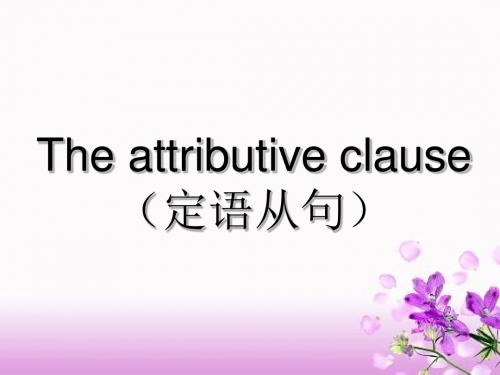
只用whether不用if的场合
1.引导主语从句且置于句首时 e.g. Whether he will go there or not is not clear. 2.引导表语从句时 e.g. The problem is whether the TV play is worth watching. 3.引导同位语从句时 e.g. The news whether our team has won the match is unknown. 4.引导宾语从句,前置,同时又作介词的宾语从句时 e.g. We are interested in whether he will agree with us or not. 5.作动词discuss的宾语时 e.g. Let’s discuss whether Mary is fit for the position. 6.其后接动词不定式时 e.g. Can you tell me whether to go or to stay.
1.关系代词前有介词时 e.g. He built a house through which he could study the sky. 2.引导非限定性定语从句时 e.g. Football, which is a very interesting game, is played all over the world. 3.先行词本身是that时 e.g. What’s that which flashed in the sky just now? 4.先行词后有插入语时 e.g. Here is the English grammar book which, as I’ve told you, will help improve your English.
高中英语---定语从句特殊情况专项讲解及练习(有答案)
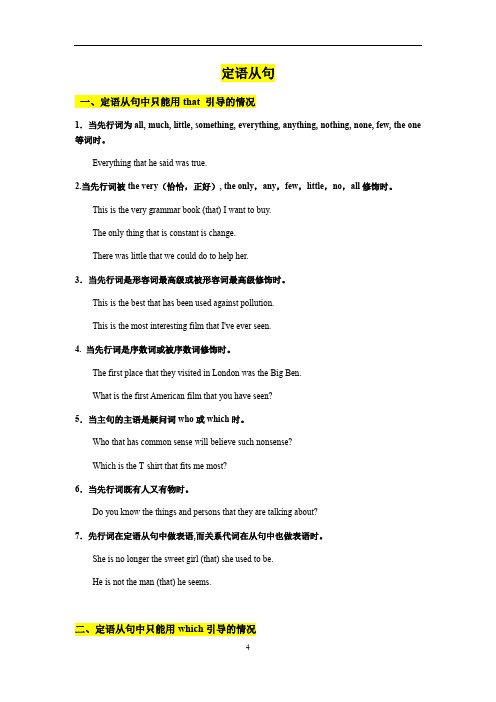
定语从句一、定语从句中只能用that 引导的情况1.当先行词为all, much, little, something, everything, anything, nothing, none, few, the one 等词时。
Everything that he said was true.2.当先行词被the very(恰恰,正好), the only,any,few,little,no,all修饰时。
This is the very grammar book (that) I want to buy.The only thing that is constant is change.There was little that we could do to help her.3.当先行词是形容词最高级或被形容词最高级修饰时。
This is the best that has been used against pollution.This is the most interesting film that I've ever seen.4. 当先行词是序数词或被序数词修饰时。
The first place that they visited in London was the Big Ben.What is the first American film that you have seen?5.当主句的主语是疑问词who或which时。
Who that has common sense will believe such nonsense?Which is the T-shirt that fits me most?6.当先行词既有人又有物时。
Do you know the things and persons that they are talking about?7.先行词在定语从句中做表语,而关系代词在从句中也做表语时。
定语从句关系代词的特殊用法
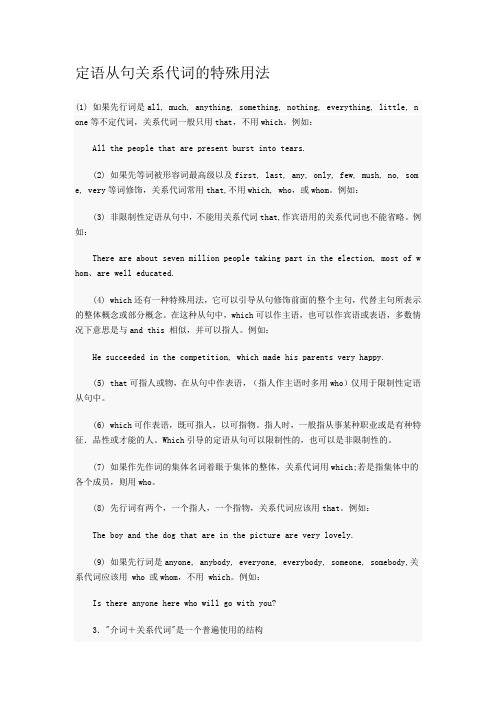
定语从句关系代词的特殊用法(1) 如果先行词是all, much, anything, something, nothing, everything, little, n one等不定代词,关系代词一般只用that,不用which。
例如:All the people that are present burst into tears.(2) 如果先等词被形容词最高级以及first, last, any, only, few, mush, no, som e, very等词修饰,关系代词常用that,不用which, who,或whom。
例如:(3) 非限制性定语从句中,不能用关系代词that,作宾语用的关系代词也不能省略。
例如:There are about seven million people taking part in the election, most of w hom、are well educated.(4) which还有一种特殊用法,它可以引导从句修饰前面的整个主句,代替主句所表示的整体概念或部分概念。
在这种从句中,which可以作主语,也可以作宾语或表语,多数情况下意思是与and this 相似,并可以指人。
例如:He succeeded in the competition, which made his parents very happy.(5) that可指人或物,在从句中作表语,(指人作主语时多用who)仅用于限制性定语从句中。
(6) which可作表语,既可指人,以可指物。
指人时,一般指从事某种职业或是有种特征.品性或才能的人。
Which引导的定语从句可以限制性的,也可以是非限制性的。
(7) 如果作先作词的集体名词着眼于集体的整体,关系代词用which;若是指集体中的各个成员,则用who。
(8) 先行词有两个,一个指人,一个指物,关系代词应该用that。
例如:The boy and the dog that are in the picture are very lovely.(9) 如果先行词是anyone, anybody, everyone, everybody, someone, somebody,关系代词应该用 who 或whom,不用 which。
定语从句关系词特殊情况
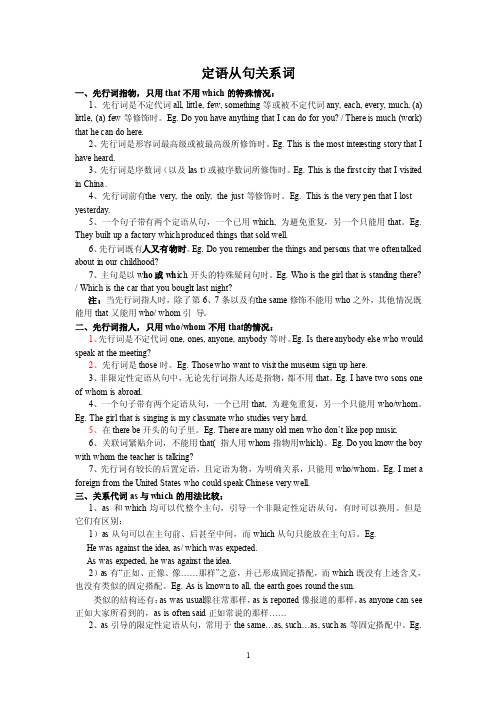
定语从句关系词一、先行词指物,只用that不用whi ch的特殊情况:1、先行词是不定代词all, little, few, someth ing等或被不定代词any, each, every, much, (a) little, (a) few等修饰时。
Eg. Do you have anythi ng that I can do for you? / Thereis much (work) that he can do here.2、先行词是形容词最高级或被最高级所修饰时。
Eg. This is the most intere sting storythat I have heard.3、先行词是序数词(以及last)或被序数词所修饰时。
Eg. This is the firstcity that I visite d in China.4、先行词前有t he very, the only, the just等修饰时。
Eg. This is the very pen that I lost yester day.5、一个句子带有两个定语从句,一个已用wh ich, 为避免重复,另一个只能用that。
Eg. They builtup a factor y whichproduc ed things that sold well.6、先行词既有人又有物时。
Eg. Do you rememb er the things and person s that we oftentalked aboutin our childh ood?7、主句是以wh o或whi ch开头的特殊疑问句时。
Eg. Who is the girl that is standi ng there? / Whichis the car that you bought last night?注:当先行词指人时,除了第6、7条以及有t he same修饰不能用wh o之外,其他情况既能用that又能用wh o/ whom引导。
三种特殊的定语从句介绍
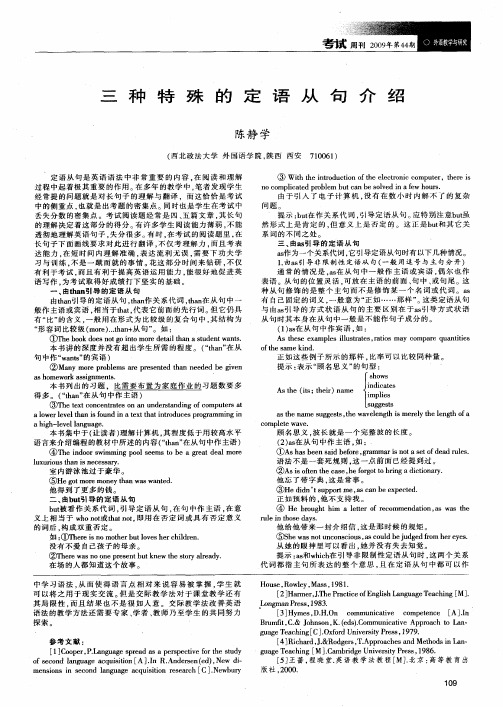
由 于 引 入 了 电 子 计 算 机 , 有 在 数 小 时 内 解 不 了 的 复 杂 没 问题。 提 示 :u 在作 关 系 代 词 , 导 定 语 从 句 。 特 别 注 意b t bt 引 应 u虽 然 形 式 上 是 肯 定 的 , 意 义 上 是 否 定 的 。 这 正 是 b t 其 它 关 但 u和 系词的不同之处。 三 、 s 导 的 定 语 从 句 由a 引 a作 为 一个 关 系代 词 , 引 导定 语从 句 时有 以下 几种 情 况 。 s 它 1由 a 引 导 非 限 制 性 定 语 从 句 ( 般 用 逗 号 与 主 句 分 开 ) 。 s 一
—
—
一
陈静 学
三 种 特 殊 的 定 语 从 句 介 绍
( 西北 政 法 大 学 外 国语 学 院 , 西 西安 陕
706 ) 1 0 1
定 语 从 句 是 英 语 语 法 中 非 常 重 要 的 内容 , 阅 读 和 理 解 在 过 程 中起 着 极其 重要 的作 用 。 多年 的教 学 中 , 者 发 现 学 生 在 笔 经 常 提 的 问 题 就 是 对 长 句 子 的 理 解 与 翻 译 ,而 这 恰 恰 是 考试 中的 侧 重 点 , 就 是 出 考 题 的 密 集 点 。同时 也 是 学 生 在 考 试 中 也 丢 失 分 数 的 密 集 点 。 考 试 阅 读 题 经 常 是 四 、 篇 文 章 , 长 句 五 其 的理 解 决 定 着 这 部分 的得 分 。 许 多 学 生 阅读 能力 薄 弱 , 能 有 不 透 彻 地 理 解 英 语 句 子 . 分 很 多 。 时 , 考试 的 阅读 题 里 , 失 有 在 在 长 句 子 下 面 画线 要 求 对此 进行 翻译 , 仅 考 理 解力 , 且 考 表 不 而 达 能 力 。 短 时 间 内 理 解 准 确 . 达 流 利 无 误 , 要 下 功 夫 学 在 表 需 习 与 训 练 。 是 一 蹴 而 就 的 事 情 。 这 部 分 时 间 来 钻 研 , 仅 不 花 不 有 利 于 考试 , 且 有 利 于 提 高 英 语 运 用 能 力 , 很 好 地 促 进 英 而 能 语 写 作 . 考 试 取 得好 成绩 打下 坚 实 的基 础 。 为
定语从句的引导词及结构解析
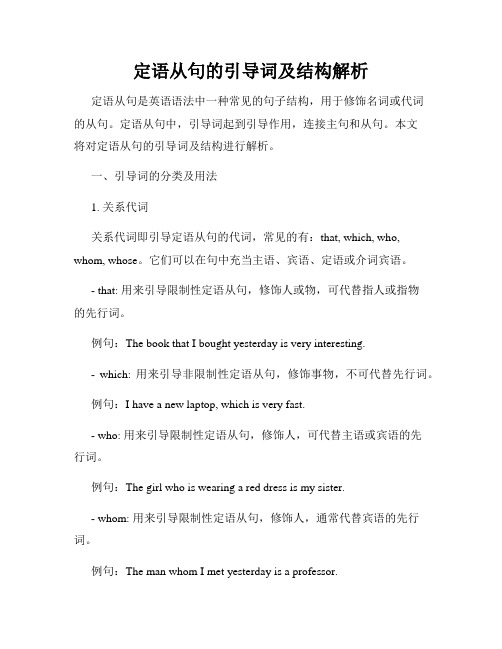
定语从句的引导词及结构解析定语从句是英语语法中一种常见的句子结构,用于修饰名词或代词的从句。
定语从句中,引导词起到引导作用,连接主句和从句。
本文将对定语从句的引导词及结构进行解析。
一、引导词的分类及用法1. 关系代词关系代词即引导定语从句的代词,常见的有:that, which, who, whom, whose。
它们可以在句中充当主语、宾语、定语或介词宾语。
- that: 用来引导限制性定语从句,修饰人或物,可代替指人或指物的先行词。
例句:The book that I bought yesterday is very interesting.- which: 用来引导非限制性定语从句,修饰事物,不可代替先行词。
例句:I have a new laptop, which is very fast.- who: 用来引导限制性定语从句,修饰人,可代替主语或宾语的先行词。
例句:The girl who is wearing a red dress is my sister.- whom: 用来引导限制性定语从句,修饰人,通常代替宾语的先行词。
例句:The man whom I met yesterday is a professor.- whose: 用来引导定语从句,修饰人或物,表示所属关系。
例句:The house whose roof is blue belongs to my friend.2. 关系副词关系副词即引导定语从句的副词,常见的有:where, when, why。
- where: 用来引导限制性或非限制性定语从句,修饰地点。
例句:This is the school where I studied.- when: 用来引导限制性或非限制性定语从句,修饰时间。
例句:That was the day when we met each other.- why: 用来引导限制性或非限制性定语从句,修饰原因。
定语从句的特殊用法

定语从句的特殊用法定语从句的特殊用法定语从句由关系词(关系代词、关系副词)引导,关系代词、关系副词位于定语从句句首。
定语从句的特殊用法定语从句由关系代词who、whom、whose、which、what、as 和关系副词where、when、why等引导,但须记住:1.what不能引导定语从句.2.关系词的分析须考虑它在定语从句中的`成分。
一.指人的关系代词有who、whose、whom、that.试分析:Theoldmanwho/whom/thatwevisitedyesterdayisafamousarti st.MissWangistakingcareofthechildwhoseparentshavegonetoB eijing.Themanwithwhommyfathershookhandsjustnowisourheadm aster.(=Themanwho/whomthatmyfathershookhandswithjustnowiso urheadmaster.)注:A.指人时有时只用who不宜用that。
1.先行词为one、ones或anyone(1)ThecomradeIwanttolearnfromistheonewhostudieshardandworks hard.(2)Anyonewhobreaksthelawshouldbepunished.2.先行词为these时ThesewhoaregoingtoBeijingarethebeststudentsofourschool.3.在therebe开头的句子中Thereisastudentwhowantstoseeyou.4.一个句子中带有两个定语从句,其中一个定语从句的关系代词是that,另一个宜用who,以免重复。
Thestudentthatwonthefirstprizeisthemonitorwhoworkshards.5.在非限制性定语从句中A。
特殊定语从句有哪些

特殊定语从句有哪些特殊定语从句有哪些下面是店铺整理的特殊定语从句,欢迎阅读。
除了限定性定语从句和非限定性定语从句以外,还有一些结构比较特殊的定语从句。
这些定语从句的基本结构与一般定语从句的结构是一样的,但加入了某些新的成分,表现形式更灵活一些,结构也更复杂一些。
因此考试命题时,常会将其作为加大试题难度的一种手段。
为了更全面地掌握这种语法现象,也为了在考试中能应对自如,我们有必要熟悉并掌握这些特殊的定语从句。
一、分裂式定语从句由于先行词有别的修饰语,或者话语间插入了其它成分,或者为了强调等某种特殊的需要,定语从句和它修饰的先行词被分裂开了,这种现象叫做分裂式定语从句。
常见的形式有:1. 被作定语的介词短语分开。
这是因为介词短语相对较短的缘故(在里,相对较短的同类句子成分应该放在前面)。
例如:We were honored to meet the chief of an African tribe there, who warmly received and feasted us.我们荣幸地见到了那儿的一个非洲部落酋长,他热情地接见并款待了我们。
The day of last year when we got to know each other led to our marriage later.去年我们初相识的那个日子导致了我们后来的结合。
2. 被谓语分开。
当主句的谓语部分较短,而定语从句又相对较长时,为了保持句子平衡,避免头重脚轻,而将定语从句放到谓语后面。
例如: The professor is sleeping who has just come back from abroad after a long journey.刚刚长途跋涉从海外归来的教授正在睡觉。
The days are gone when we Chinese were looked down on as Eastern Sick Man.我们中国人被看作东亚病夫的日子一去不复返了。
特殊定语从句

特殊定语从句:一1. 限制性定语从句与先行词关系非常密切,如果去掉,主句意思含糊不清;主从句之间不用逗号隔开;翻译时一般译成前置定语;关系代词作宾语可以省略。
非限制性定语从句是对先行词的补充说明,缺少不会影响整个句子的含义;主从句一般用逗号隔开;翻译时一般译成并列形式;所有的关系词均不可省略。
In an hour, we can travel to places which would have taken our ancestors days to reach.This was a time when / during which the two countries were at war.In China and Japan there are mid – autumn festivals, when people admire the moon and give gifts of moon cakes.My mother, whom you met last year, keeps telling me not to take them because they are dangerous.Last month I met Holly, who was then preparing for a test.2. 关系词的选用:(1) 非限制性定语从句中,如果先行词为表示物的名词,只用which 不用that ,which可以指代先行词、句子或短语;而在限制性定语从句中两者均可。
Corn wasn’t the only food that / which was taken to Europe.It broadcasts all kinds of programmes, which change from month to month.(2) 限制性定语从句中,先行词作宾语,引导词可省略;非限制性定语从句中不可省略,whom不能用who / that替换。
定语从句的用法归纳总结
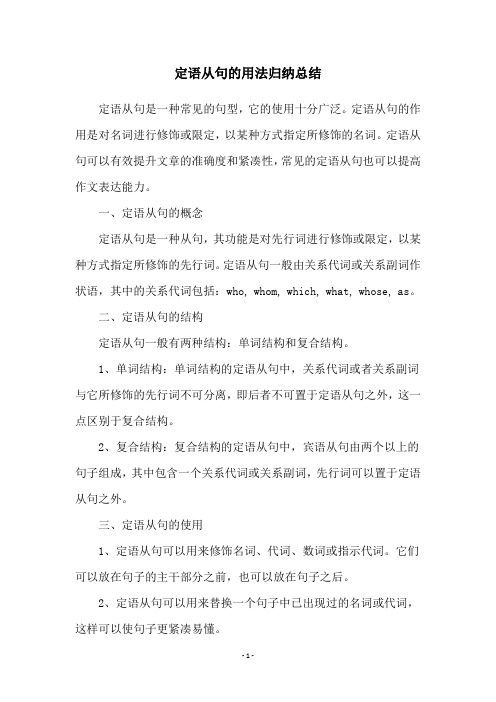
定语从句的用法归纳总结定语从句是一种常见的句型,它的使用十分广泛。
定语从句的作用是对名词进行修饰或限定,以某种方式指定所修饰的名词。
定语从句可以有效提升文章的准确度和紧凑性,常见的定语从句也可以提高作文表达能力。
一、定语从句的概念定语从句是一种从句,其功能是对先行词进行修饰或限定,以某种方式指定所修饰的先行词。
定语从句一般由关系代词或关系副词作状语,其中的关系代词包括:who, whom, which, what, whose, as。
二、定语从句的结构定语从句一般有两种结构:单词结构和复合结构。
1、单词结构:单词结构的定语从句中,关系代词或者关系副词与它所修饰的先行词不可分离,即后者不可置于定语从句之外,这一点区别于复合结构。
2、复合结构:复合结构的定语从句中,宾语从句由两个以上的句子组成,其中包含一个关系代词或关系副词,先行词可以置于定语从句之外。
三、定语从句的使用1、定语从句可以用来修饰名词、代词、数词或指示代词。
它们可以放在句子的主干部分之前,也可以放在句子之后。
2、定语从句可以用来替换一个句子中已出现过的名词或代词,这样可以使句子更紧凑易懂。
3、定语从句也可用来强调一个句子中名词或代词的特定意思,从而提高句子的准确性。
四、定语从句的特殊情况1、定语从句可以引导介词短语,此时介词短语在句子中作状语,从句的关系代词或者关系副词可以放在介词的前面,也可以放在介词的后面。
2、定语从句也可以修饰不定式或动词短语,此类定语从句叫做不定式定语从句或动词短语定语从句。
3、另外,定语从句还可以引导被动语态,其中宾语从句中需要使用系动词,以便表达被动形式。
以上就是定语从句的用法归纳总结,由此可见定语从句在书面表达中有着十分重要的作用,而且它的使用也越来越普及,所以学习定语从句对于增强英语表达能力非常有必要。
希望通过本文,可以帮助大家深入理解定语从句的知识点,从而提高英语水平。
高考英语定语从句特殊情况下用法讲解

高考英语定语从句特殊情况下用法讲解一、考点分析定语从句的介词加关系代词的用法是定居从句中的重难点,在题型上主要在语法填空和翻译句子中考到。
二、专题详解A、定语从句中只能用that 引导的情况1.当先行词为all, much, little, something, everything, anything, nothing, none, few, the one等词时。
Everything that he said was true.2.当先行词被the very(恰恰,正好), the only,any,few,little,no,all修饰时。
This is the very grammar book (that) I want to buy.The only thing that is constant is change.There was little that we could do to help her.3.当先行词是形容词最高级或被形容词最高级修饰时。
This is the best that has been used against pollution.This is the most interesting film that I've ever seen.4. 当先行词是序数词或被序数词修饰时。
The first place that they visited in London was the Big Ben.What is the first American film that you have seen?5.当主句的主语是疑问词who或which时。
Who that has common sense will believe such nonsense?Which is the T-shirt that fits me most?6.当先行词既有人又有物时。
复习定语从句特殊用法
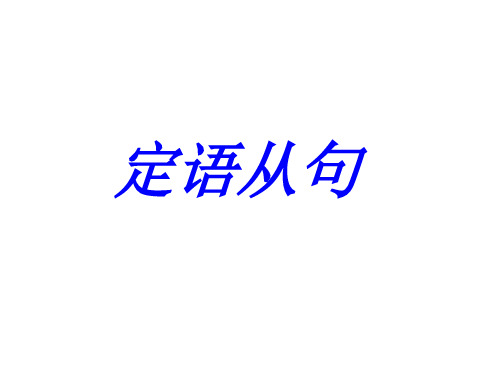
一、先行词和关系词
代词叫做“ 被定语从句所修饰的名词或 代词叫做“先行 引导定语从句的词叫“关系词” 词”。引导定语从句的词叫“关系词”。 There was a young man who liked adventure.
二、定语从句的种类 1、限定性定语从句 、 This is the man who gave me this book. 2、非限定性定语从句 、 Li Ming, who is in the room, wants to ask you some questions.
5. Tom is the only one of the boys who like likes playing football. 6. Who is the girl that you talked to her just now? 去掉her 去掉 7. This is the very pen that you gave it to it去掉 去掉 me before. 8. There is an old woman, that is holding a stick who
3. 先行词是序数词或被序数词修饰时。 先行词是序数词或被序数词修饰 序数词或被序数词修饰时 We will never forget the first lesson that our chemistry teacher gave us. 4. 先行词是形容词最高级或被形容词最高级修 先行词是形容词最高级或被形容词最高级修 饰时。 饰时。 What is the smallest thing that can be seen under a microscope? 5.先行词同时包含人和物时。 先行词同时包含人和物时 先行词同时包含人和物时。 The visitor spoke highly of the children and the performance that they saw at the Children’s Palace.
定语从句特殊情况

定语从句特殊情况定语从句中只⽤that不⽤as的情况【观察】 1. Is there anything(that) I can do for you in town?2. All the books that have selected are useful ones.3. The first thing(that) we should do is to work out the plan.4. This is one of the most exciting table tennis games that I have ever seen.5. The last place that we visited in the countryside was a farm.6. They talked about the persons and things that they remembered at school.7. Who that has seen the film doesn’t like it?8. I’ll never forget the Sunday(that) my baby was born.9. This is the way that my father did this work.【归纳】限制性定语从句中只能⽤that 引导定语从句的⼏种情况:1. 当先⾏词是everything, anything, nothing (something 除外), all, none, few, little, some等不定代词时,或当先⾏词受every, any, all, some, no, little, few, much等词修饰时。
如:Have you set down everything that Mr Li said?There seems to be nothing that is impossible to him in the world.注意:当先⾏词指⼈时,偶尔也可⽤关系代词who。
特殊的定语从句As的用法

特殊的定语从句As的用法特殊的定语从句As的用法特殊的定语从句As的用法如下:1、引导限制性定语从句。
在主句中常有the same, so或such与as相呼应, as在定语从句中可作主语、宾语、主语补足语等。
as引出的定语从句带有比较意义,从句常常只写出比较部分,但as本身不可省略。
例如:He used such expressions as he could find in the texts. 他使用在课文中可以找到的那些词语。
They stayed for the night in the same room as they had once rented.他们在他们曾租用过的同一房间过夜。
注意:在the same…后也可用that引导定语从句,但含义有所不同。
that引出的从句,指的是与先行词同一的事物,而as引导的从句指的.是与先行词同类的事物。
例如: This is the same bag as I lost yesterday.这个包和我昨天丢失的包的样子是同样的。
This is the same bag that I lost yesterday.这就是我昨天丢失的那个包。
2、引导非限制性定语从句。
带主句的全部或部分内容。
常译为“正如-------”“就像------”等,定语从句可以置于主句句首、句中或句末。
as后常接expect, know, report, say, see等动词的主、被动语态。
例如:As is known to everybody, the moon travels round the earth once every month.正如大家所知道的那样,月球每月绕着地球转一圈。
He wasn’t unconscious, as could be judged from his eyes.他并未失去知觉,这从他的眼神可以看出来。
注意:as, which引导非限制性定语从句的区别:1)都可以代整个主句,相当于and this或and that.2)as可放在句首,而which不能。
where引导定语从句特殊

where引导定语从句特殊where引导定语从句特殊定语从句是高中英语学习的重要语法项目之一,也是历年高考的热点,下面店铺精心为大家整理了where引导定语从句特殊相关内容,希望对大家有所帮助!一、where定语从句修饰抽象名词pointYou reach a point wheremedicine can’t help.你已到了药物无法治疗的地步。
The crisis has reached a point wherethe receiver will have to be called in.危机已达到非把破产管理人叫来不可的地步。
We have reached a point wherea change is needed.我们到了必须改一改的地步。
注:有时point也可以是具体的地点:Let the point whereAB cuts CD be called E.设AB线与CD线的相交点为E。
The accident happened at the point wherethe A15 joins the M1.事故发生在A15与M1交叉的十字路口。
二、where定语从句修饰抽象名词caseThere are cases wherethe word“mighty”is used as an adverb.在一些情况下,mighty一词可用作副词。
Today, we’ll discuss a number of cases wherebeginners of English fail to use the language properly.今天,我们将讨论一些英语初学者对英语使用不当的问题。
三、where定语从句修饰抽象名词activityThose successful deaf dancers think that dancing is an activity wheresight matters more than hearing.那些失聪的成功舞蹈演员们认为,舞蹈是一种让人看胜过让人听的活动。
定语从句特殊形式

Real friends are those who,when you have made a fool of yourself, don’t feel that you have done a permanent job.
插入语一般只放在定语从句的关系词后面
back
Many students face problems when they have to to study a subject that they think is difficult.
作宾语的关系词+插入语+定语从句的主谓部分:
He had a very selfish girl who I could not have dreamed many boys fell in love with.
He referred me to some reference books ______ with which I am not very familiar .(ad.)
• 关系代词前面的介词有时与固定的介宾短语相关,比如in this case, in one’s honor会变成相应的形式in which case , in whose honor。这时关系代词前的介词是从原来短语中继承过来的 。
正如大家所知道的那样,月球每月绕着地球转一圈。
3)主句从句内容一致时,或说从句内容顺主句说下来时,通 常用as. He wasn’t unconscious, as could be judged from his eyes.
他未失去知觉,这从他的眼神可以看出来。
He is a teacher,as is clear from his manner.
定语从句(只用that不用which的特殊情况)
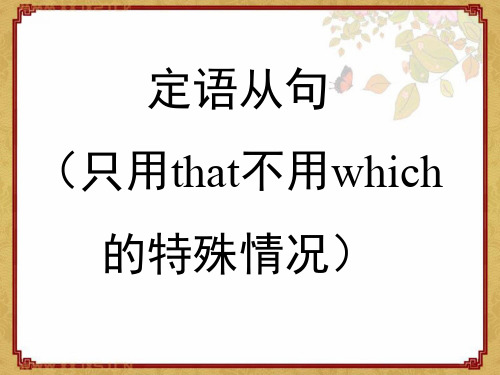
2) 当先行词被very, both, the only, all, every, no, any, little, much, some 等修饰时。
a ) And then I watched all the glasses that were on the table fall off onto the floor
定语从句 (只用that不用which
的特殊情况)
1) 当 先 行 词 为 all, everything, nothing, little, much 等不定代词时。
Eg: a) Tell me everything that you know Translation: 他告诉了我们他所做的一切。
4) 当先行词既包括人又包括物时。
The generals complained that the Defence Department had not sent the extra men and equipment that they needed.
5) 当主句the only English-Chinese dictionary that I have .
3) 当先行词被形容词的最高级,序 数词修饰时。
a) This is the most beautiful city that I have visited .
b) This is the last lesson that we have this term .
a) Which is the coat that you like best ?
b)Who is the man that was talking to you ?
定语从句的特殊情况
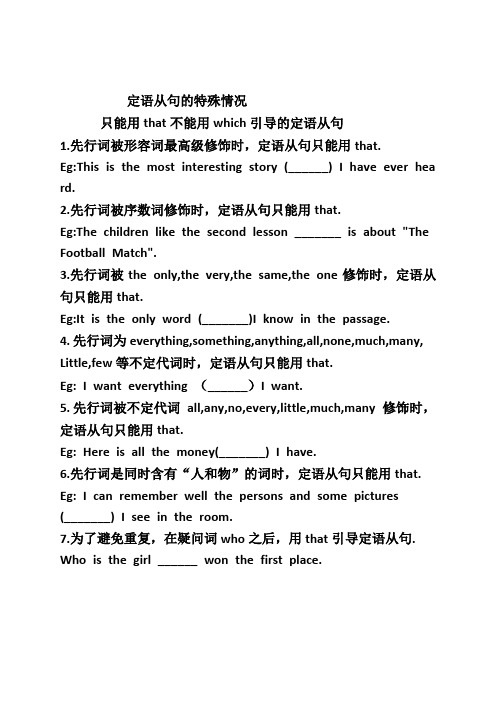
定语从句的特殊情况只能用that不能用which引导的定语从句1.先行词被形容词最高级修饰时,定语从句只能用that.Eg:This is the most interesting story (______) I have ever hea rd.2.先行词被序数词修饰时,定语从句只能用that.Eg:The children like the second lesson _______ is about "The Football Match".3.先行词被the only,the very,the same,the one修饰时,定语从句只能用that.Eg:It is the only word (_______)I know in the passage.4.先行词为everything,something,anything,all,none,much,many, Little,few等不定代词时,定语从句只能用that.Eg: I want everything (______)I want.5.先行词被不定代词all,any,no,every,little,much,many修饰时,定语从句只能用that.Eg: Here is all the money(_______) I have.6.先行词是同时含有“人和物”的词时,定语从句只能用that. Eg: I can remember well the persons and some pictures(_______) I see in the room.7.为了避免重复,在疑问词who之后,用that引导定语从句. Who is the girl ______ won the first place.。
定语从句的特殊用法
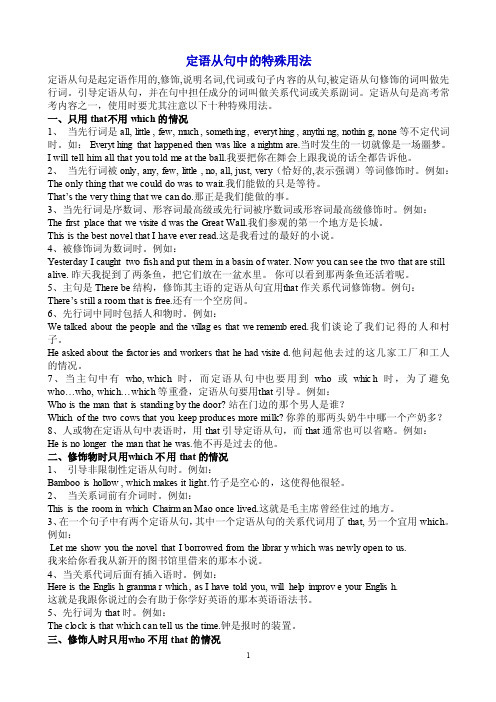
定语从句中的特殊用法定语从句是起定语作用的,修饰,说明名词,代词或句子内容的从句,被定语从句修饰的词叫做先行词。
引导定语从句,并在句中担任成分的词叫做关系代词或关系副词。
定语从句是高考常考内容之一,使用时要尤其注意以下十种特殊用法。
一、只用that不用which的情况1、当先行词是al l, little, few, much, somethi ng, everyth ing, anythin g, nothing, none等不定代词时。
如: Everyth ing that happene d then was like a nightma re.当时发生的一切就像是一场噩梦。
I will tell him all that you told me at the ball.我要把你在舞会上跟我说的话全都告诉他。
2、当先行词被on ly, any, few, little, no, all, just, very(恰好的,表示强调)等词修饰时。
例如:The only thing that we could do was to wait.我们能做的只是等待。
That’s the very thing that we can do.那正是我们能做的事。
3、当先行词是序数词、形容词最高级或先行词被序数词或形容词最高级修饰时。
例如:The first place that we visited was the Great Wall.我们参观的第一个地方是长城。
This is the best novel that I have ever read.这是我看过的最好的小说。
4、被修饰词为数词时。
例如:Yesterd ay I caughttwo fish and put them in a basin of water. Now you can see the two that are still alive. 昨天我捉到了两条鱼,把它们放在一盆水里。
- 1、下载文档前请自行甄别文档内容的完整性,平台不提供额外的编辑、内容补充、找答案等附加服务。
- 2、"仅部分预览"的文档,不可在线预览部分如存在完整性等问题,可反馈申请退款(可完整预览的文档不适用该条件!)。
- 3、如文档侵犯您的权益,请联系客服反馈,我们会尽快为您处理(人工客服工作时间:9:00-18:30)。
定语从句中只用that不用as的情况【观察】1. Is there anything (that ) lean do for you in town?2.All the books that have selected are useful ones.3.The first thing (that ) we should do is to work out the plan.4.This is one of the most exciting table tennis games that I have ever seen.5.The last place that we visited in the countryside was a farm.6.They talked about the persons and things that they remembered at school.7.Who that has seen the film doesn ' t like it?8.I ' ll never forget the Sunday ( that ) my baby was born.9.This is the way that my father did this work.【归纳】限制性定语从句中只能用that引导定语从句的几种情况:1.当先行词是everything, anything, nothing ( something 除夕卜),all, none, few, little,等不定代词时,或当先行词受every, any, all, some, no, little, few, much 等词修饰时。
Have you set down everything that Mr Li said?There seems to be nothing that is impossible to him in the world.注意:当先行词指人时,偶尔也可用关系代词whQ如:Any man that / who has a sense of duty won ' t do such a thing.All the guests that / who were invited to her wedding were important people.2.当先行词被序数词修饰时。
如:The first American movie that I watched was the Titanic.3.当先行词被形容词最高级修饰时。
如:This is the best museum that I have visited all my life.4.当先行词被the very, the only, the first / last 等修饰时。
如:She is the only person that understands me.After the big fire, the old car is the only thing that he owns.注意:当先行词指人时,偶尔也可以用关系代词who。
如:Wang Hua is the only person in our school who will attend the meeting.5.当先行词前面有who, which等疑问代词时。
如:Who is the man that is standing in front of the crowd?Which is the room that Mr Wang lives in?6.当先行词为人与动物或人与物时。
如:Look at the man and his donkey that are walking up the street.7.当先行词是reason, way (方法)等词时,关系代词常用that代替in which, for which, why,也常可省略。
如:She admired the way (that ) they solved the questions.【歌诀】从句前有“不定式”,先行词前有only, when ,some, any, the very 在,或有“高”、“序”去替代,只用that来安排。
【小试】用适当的关系词完成下列句子。
1. The only book I want to read is missing.2.This is the second book I have ever written.some 如:3.This is all I want to say at the meeting.4.Have you any novels are worth reading?5.Let ' s talk about the persons and the thingswe can remember.6.Everything we have seen in China is moving.7.I have nothing is worth reading.8.Who you have ever seen can beat him in chess?(答案略)2.只用which,不能用that作先行词的情况(1)在介词提前到关系代词之前形成“介词+关系代词”结构来修饰表事物的先行词时,关系代词必须用which.例如:①The house in which we live is very large. 我们住的房子非常大。
②This is the reference boo k of which the teacher is speaking. 这就是老师正在谈及的那本参考书。
注意:如果介词不放在修饰事物的限定性定语从句的句首,which就可换为that,例如:This isthe question which/that we ' ve had so much discussion about. =This is the question about which we ve had so much discussion. 这就是我们已经多次讨论过的问题。
(2)先行词为“ those +表事物的复数名词”时,关系代词通常只用which而不用that.例如:①Students should keep in mind those regulations which restrict their behavior. 学生应牢记那些规范自己的行为准则。
② A bookshop should deal with a variety of those best sellers which are newly published. 书店应该经营新出版的各种畅销书。
同学你好,引导状语从句的连词as可以用作关系代词,引导定语从句,因而被称作准关系代词。
1.准关系代词as引导限制定语从句,用于以下3个结构中,as在从句中作主语、宾语或表语:a.so / such …asSuch people as were mentioned by him were honest. (as 作主语)I' ve never seen such a clever man as he is. (as 作表语)Last term our maths teacher set so difficult an (= such a difficult) examination problem as noneof us worked out.b.the same …asModern statemen are often faced with the same problem as defeated the ancient Romans. (as 作宾语)I like the same book as you do. (as 作宾语)c.as …asAs many children as came were given some cakes. (as 作主语)He is as diligent a man as ever lived. (as 作主语)补充:a. such…as与such…that 的区另Usuch…as引导定语从句;such…that 引导结果状语从句。
They talked in such simple English as children could understand.他们用孩子们能听懂的简单的英语交谈。
They talked in such simple English that children could understand it.他们用十分简单的英语交谈,连孩子们都能听懂。
I will provide you with such things as you may need.我要供给你一些你可以用得着的东西。
He shut the window with such a force that the glass broke.他如此用力地关门,结果玻璃碎了。
b. the same …as 与the same …that 的区另U:the same…as指两物相似,the same.. 描述的是同一物。
This is the same bag as I lost yesterday.这个书包和我昨天丢失的(书包)相似。
(相似物)This is the same bag that I lost yesterday.这正是我昨天丢失的那个书包。
(同一物)2.准关系代词as引导非限制定语从句。
a.as引导非限制性定语从句,只代表主语或主句的一部分所表达的意思(不能指代某个名词或代词),可以放在主句前,后或中间,在从句中作主语或宾语、例如:As is known to all, he is the best student in our class. (as 指代整个句子,作主语,置于句首)He opposed the idea, as could be expected. (as 指代整个句子,作主语,置于句末)As we all know, he studies very hard. (as 指代整个句子,作宾语,置于句首)Taiwan is, as you know, an inseparable part of China. (as 指代整个句子,作宾语,置于句中)常用的这类句式有:as is said above 综上所述-as is known to all 众所周知as is often the case 通常如此-as is reported in the newspaper 如报纸所报导的b.主句具有否定意义,as引导的定语从句位于主句之后时,as指代得主句不包括否定意义,并可用but 取代。
